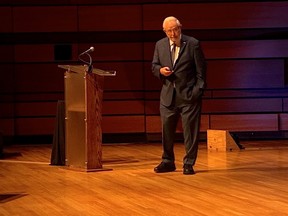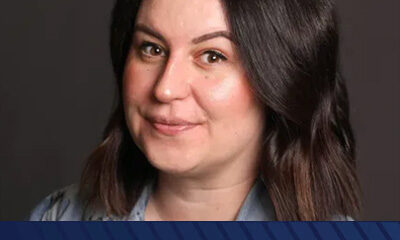Science
Queen’s University Celebrates a Decade Since Nobel Win with New Funding

Queen’s University marked the tenth anniversary of Professor Emeritus Art McDonald‘s Nobel Prize in Physics with a gathering of prominent scientific minds and a significant announcement of $45.5 million in federal funding. This investment over five years will support the Arthur B. McDonald Canadian Astroparticle Physics Research Institute, underscoring Canada’s commitment to leading in this specialized field of research.
During the event, McDonald reflected on the progress made since his award in 2015. He emphasized how particle physics research in Canada has flourished since its inception at SNOLAB in Sudbury, Ontario. “Canada has made a choice that this is an area that Canada can be a world expert in,” he stated, highlighting the country’s emergence as a leader in the evolving discipline of astroparticle physics.
Federal Funding Fuels Research Growth
The newly announced funding will enable the McDonald Institute and its partner universities to recruit additional researchers nationwide. Patrick Dean, principal of Queen’s University, noted the importance of this moment, saying, “This is the kind of moment that reminds us not only of past triumph but also of the limitless potential that lies ahead when vision, collaboration, and support come together, particularly in the field of research.”
Similarly, Alejandro Adem, president of the Natural Sciences and Engineering Research Council of Canada, expressed pride in Canada’s scientific tradition, stating, “We have a proud tradition in this discipline, which goes to the heart of who we are as humans and what the universe is all about.”
Even prior to McDonald’s Nobel recognition, the work conducted at SNOLAB had already established a network of physicists across nearly two dozen universities and institutions, collaborating to address fundamental questions about the universe.
Addressing Fundamental Questions
Despite the advancements, challenges remain, as noted by Tony Noble, the scientific director at the McDonald Institute. He shared a poignant observation: “When we look out at the universe, we understand everything in terms of how the galaxy is formed, how the universe has evolved, and yet 85 percent of the matter in the universe, we have no idea what it is.”
He added, “We don’t know why the universe is made of matter and not antimatter. These are conundrums that make you wonder a little bit.” This gap in understanding presents a significant opportunity for research, particularly for students like Julia Brachman and Zoe Brisson-Tsavoussis at Queen’s.
Brachman, a third-year undergraduate student, expressed how McDonald’s achievements inspired her. “When the Nobel Prize was won 10 years ago, I was 10 years old in elementary school, and I would not have had a concept I would be studying particle physics,” she said. Her encounter with McDonald while in high school sparked her interest in the field.
Brisson-Tsavoussis, a PhD candidate in physics, emphasized Canada’s competitiveness in dark matter research and other areas, saying, “I’m most interested in neutrinos, that’s kind of my passion. They’re so incredible because they can tell us messages from across the universe.”
As Queen’s University celebrates this milestone, the collaboration fostered through the McDonald Institute continues to pave the way for groundbreaking discoveries in physics, enhancing Canada’s reputation in the global scientific community.
-

 Politics4 weeks ago
Politics4 weeks agoSecwepemc First Nation Seeks Aboriginal Title Over Kamloops Area
-

 World5 months ago
World5 months agoScientists Unearth Ancient Antarctic Ice to Unlock Climate Secrets
-

 Entertainment5 months ago
Entertainment5 months agoTrump and McCormick to Announce $70 Billion Energy Investments
-

 Science5 months ago
Science5 months agoFour Astronauts Return to Earth After International Space Station Mission
-

 Lifestyle5 months ago
Lifestyle5 months agoTransLink Launches Food Truck Program to Boost Revenue in Vancouver
-

 Technology3 months ago
Technology3 months agoApple Notes Enhances Functionality with Markdown Support in macOS 26
-

 Lifestyle3 months ago
Lifestyle3 months agoManitoba’s Burger Champion Shines Again Amid Dining Innovations
-

 Top Stories2 months ago
Top Stories2 months agoUrgent Update: Fatal Crash on Highway 99 Claims Life of Pitt Meadows Man
-

 Politics4 months ago
Politics4 months agoUkrainian Tennis Star Elina Svitolina Faces Death Threats Online
-

 Sports5 months ago
Sports5 months agoSearch Underway for Missing Hunter Amid Hokkaido Bear Emergency
-

 Politics5 months ago
Politics5 months agoCarney Engages First Nations Leaders at Development Law Summit
-

 Technology5 months ago
Technology5 months agoFrosthaven Launches Early Access on July 31, 2025





















